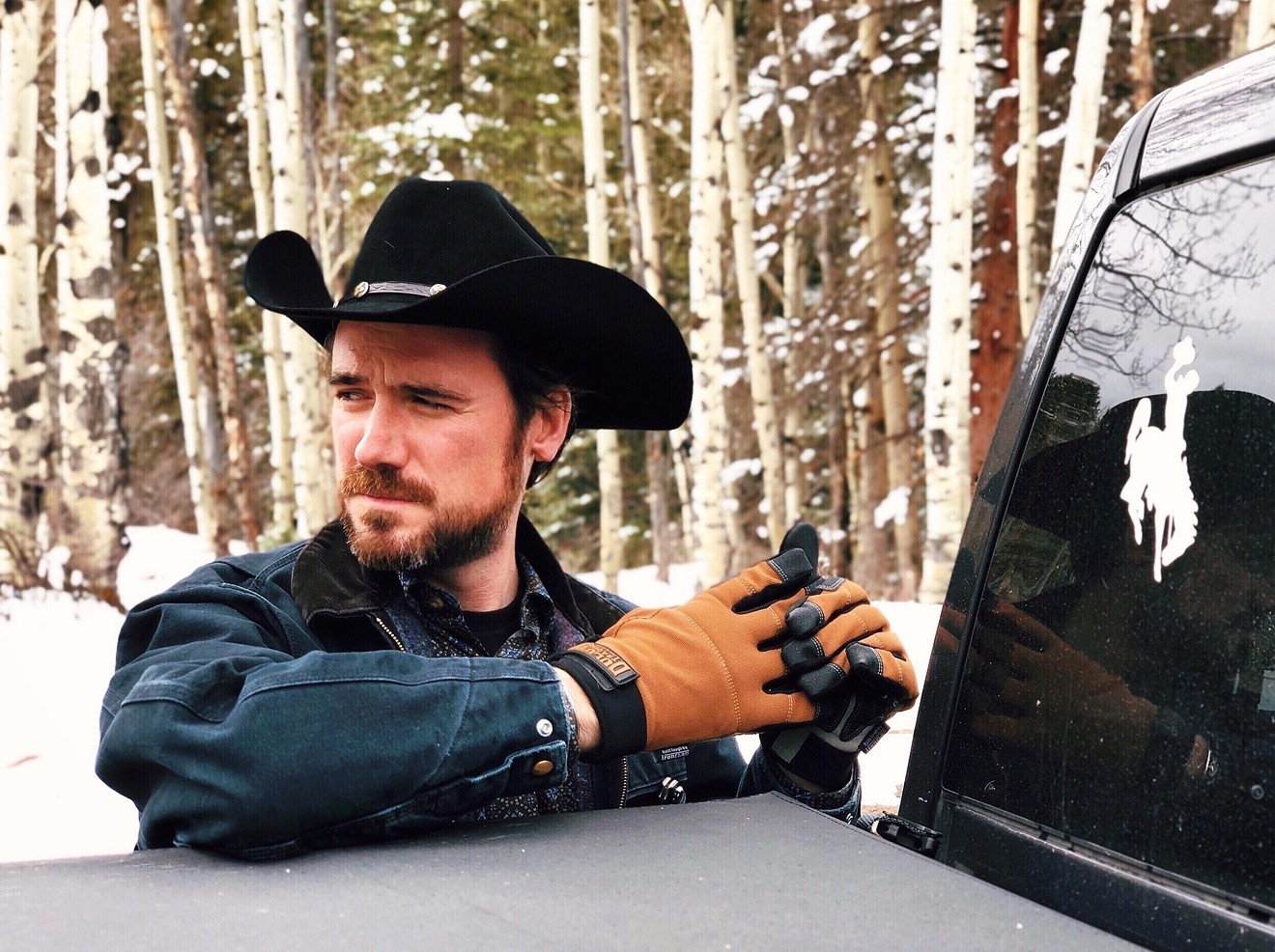Colorado is replete with wanderers of different types: some of us hike, some of us ski backcountry, some of us do our wandering in the inky landscapes of books. So it only makes sense that Dr. Jackson Crawford would address the needs of the wandering throng in his recent translation of the Norse epic poem The Wanderer’s Hávamál.
Crawford, a popular professor whose classes on Norse mythology and Icelandic sagas are among the most popular courses at the University of Colorado Boulder, brings his new book to the Boulder Book Store on Monday, December 9, for a reading and signing. We caught up with Crawford to talk about the original work, his translation, and exactly where in Colorado it might be best to take it, and take it all in.
Westword: You're visiting the Boulder Book Store on Monday, December 9. What do you have planned for the evening? Will people be able to look forward to hearing some old Norse read aloud to them? That sounds like a unique experience.
Crawford: I’ll be reading selections from the poem Hávamál in all three of the different variants that appear in my new book, The Wanderer’s Hávamál. First, you’ll get to hear some of it in Old Norse as it actually sounded when it was written down. Old Norse is one of the best-attested extinct languages in the world, and because of that, and our ability to “triangulate” from the sound systems of its descendant languages (like Norwegian and Icelandic), scholars can be uniquely confident about reconstructing its sounds. I’ll also be reading from the formal English translation that faces the Old Norse text in my book, which I have been tweaking and perfecting for the past nine years. Then I’ll also read from The Cowboy Hávamál, my reimagining of the advice of Hávamál’s proverbs in the voice of my own grandfather. I’ll also present a little bit about the history and context of Hávamál, what the book has meant to me, and I’ll take some questions from the audience before signing copies.
For the uninitiated, can you explain what the Hávamál is as a text?
Hávamál is a condensation of practical wisdom preserved in the Old Norse language and attributed to the god Odin (Óðinn in Old Norse). It is preserved in the medieval Icelandic collection called the Poetic Edda. Although it’s attributed to a god and contains some mysterious stories about him such as his sacrifice of himself to himself, at its heart is a wealth of real-world wisdom that suggests the authentic voice of a long life of hard experience.
What drew you to translating that text specifically?
I first encountered Hávamál in small extracts that I read in Edith Hamilton’s Mythology when I was eleven or twelve. I was struck by how much the practical wisdom and cynical tone reminded me of the vague “Code of the West” and the advice I received from my grandfather. I thought of it as something of a codification or confirmation of the philosophy I learned at his knee. Later, after I had begun studying Old Norse late in high school, it was the first thing I wanted to read in that language, and I began to memorize it in the original. After I began teaching Norse mythology, I realized that no available English translation used English that was approachable enough for modern-day readers to appreciate its real sense of humor and its universally applicable wisdom. So I began translating it myself, and the earliest published version of that translation appeared in my translation of the whole Poetic Edda, The Poetic Edda: Stories of the Norse Gods and Heroes. I’ve continued to tweak and perfect that translation since, and now I’m excited in The Wanderer’s Hávamál to have the chance to show you my translation side by side with the original Old Norse, along with a commentary that often explains the more difficult translation decisions I’ve had to make.
Why make it a portable edition? What makes Hávamál something that wanderers might want to pack along with them?
Hávamál emphasizes that “A traveler cannot bring / a better burden on the road / than plenty of wisdom. / It will prove better than money / in an unfamiliar place— / wisdom is the comfort of the poor” in stanza 10 or in The Cowboy Hávamál: “That head on your shoulders / is the best thing you’ll ever have. / And no amount o’ money / can make up for not havin’ it. / Keep it in good shape."). My publisher and I had the goal of making this an easily carried, easily “wandered with” book so that someone who felt inspired by it could reach for the time-tested wisdom of Hávamál whenever it was needed.
Part of it was the fascination with Hávamál itself, which I encountered by accident very early. But what drove me to a career as an educator and translator in this field began with my childhood fascination with dinosaurs and the evolution of prehistoric life. I was so into dinosaurs that when I had to choose a language to study in middle school, I chose Latin, because the dinosaur names were in Latin. But from Latin I gained an understanding that language also evolved, and I became fascinated with the ways languages change over time and how different languages that start out being closely related to each other go in very different directions. By the doctorate level, I specialized in Old Norse and the history of the Scandinavian languages, because I thought these presented the most compelling “alternate history” of English, which after all was still mutually intelligible with Old Norse a thousand years ago.
What are your thoughts on how Norse culture has been portrayed in pop culture? In a TV series like the History Channel's Vikings, or in Marvel's Thor movies?
I’m generally not very interested in pop-culture Vikings, although I’ve consulted on a lot of movies, TV shows and video games in the last six years (for example, on Frozen and on the American Gods series). There is a huge Vikingophile subculture that has developed in the last twenty or so years, but I don’t identify as a Viking and don’t enjoy spending my downtime watching some Hollywood producer making a fortune off not even trying to understand something that I’ll be forever in debt for going to school to understand.
What beverage would you say most aptly fits the reading of Hávamál?
Well water.
And where best to have that well water? Where in Colorado is the perfect place to hike to, pull out a copy of The Wanderer's Hávamál, and have the perfect Norse moment?
The San Juans. What place in the world could lift your spirit higher than its most splendid mountains?
Jackson Crawford will regale the audience with Old Norse readings from The Wanderer’s Hávamál at 7:30 p.m. on Monday, December 9, at the Boulder Book Store, 1107 Pearl Street in Boulder.
[
{
"name": "Air - MediumRectangle - Inline Content - Mobile Display Size",
"component": "12017618",
"insertPoint": "2",
"requiredCountToDisplay": "2"
},{
"name": "Editor Picks",
"component": "17242653",
"insertPoint": "4",
"requiredCountToDisplay": "1"
},{
"name": "Inline Links",
"component": "18838239",
"insertPoint": "8th",
"startingPoint": 8,
"requiredCountToDisplay": "7",
"maxInsertions": 25
},{
"name": "Air - MediumRectangle - Combo - Inline Content",
"component": "17261320",
"insertPoint": "8th",
"startingPoint": 8,
"requiredCountToDisplay": "7",
"maxInsertions": 25
},{
"name": "Inline Links",
"component": "18838239",
"insertPoint": "8th",
"startingPoint": 12,
"requiredCountToDisplay": "11",
"maxInsertions": 25
},{
"name": "Air - Leaderboard Tower - Combo - Inline Content",
"component": "17261321",
"insertPoint": "8th",
"startingPoint": 12,
"requiredCountToDisplay": "11",
"maxInsertions": 25
}
]













